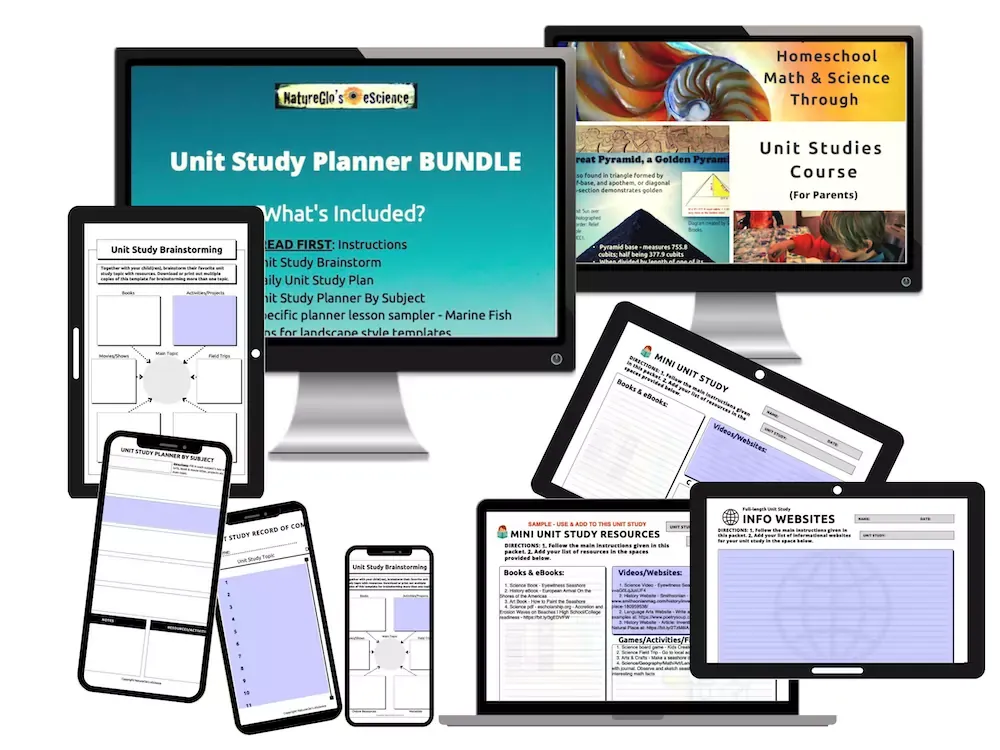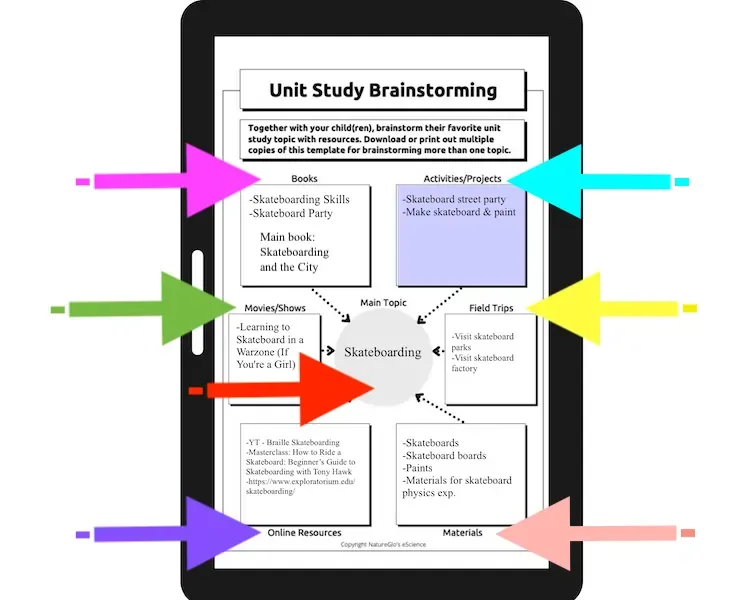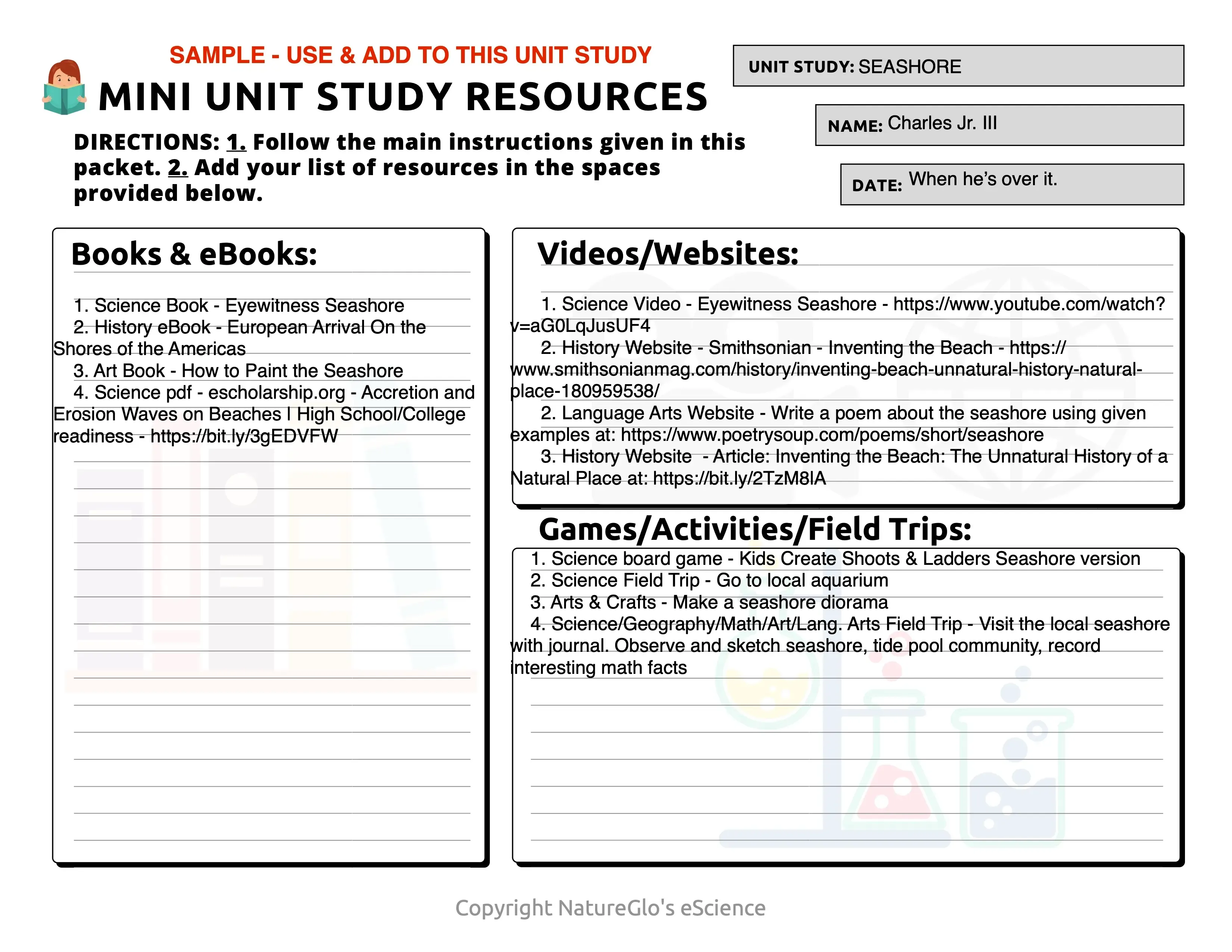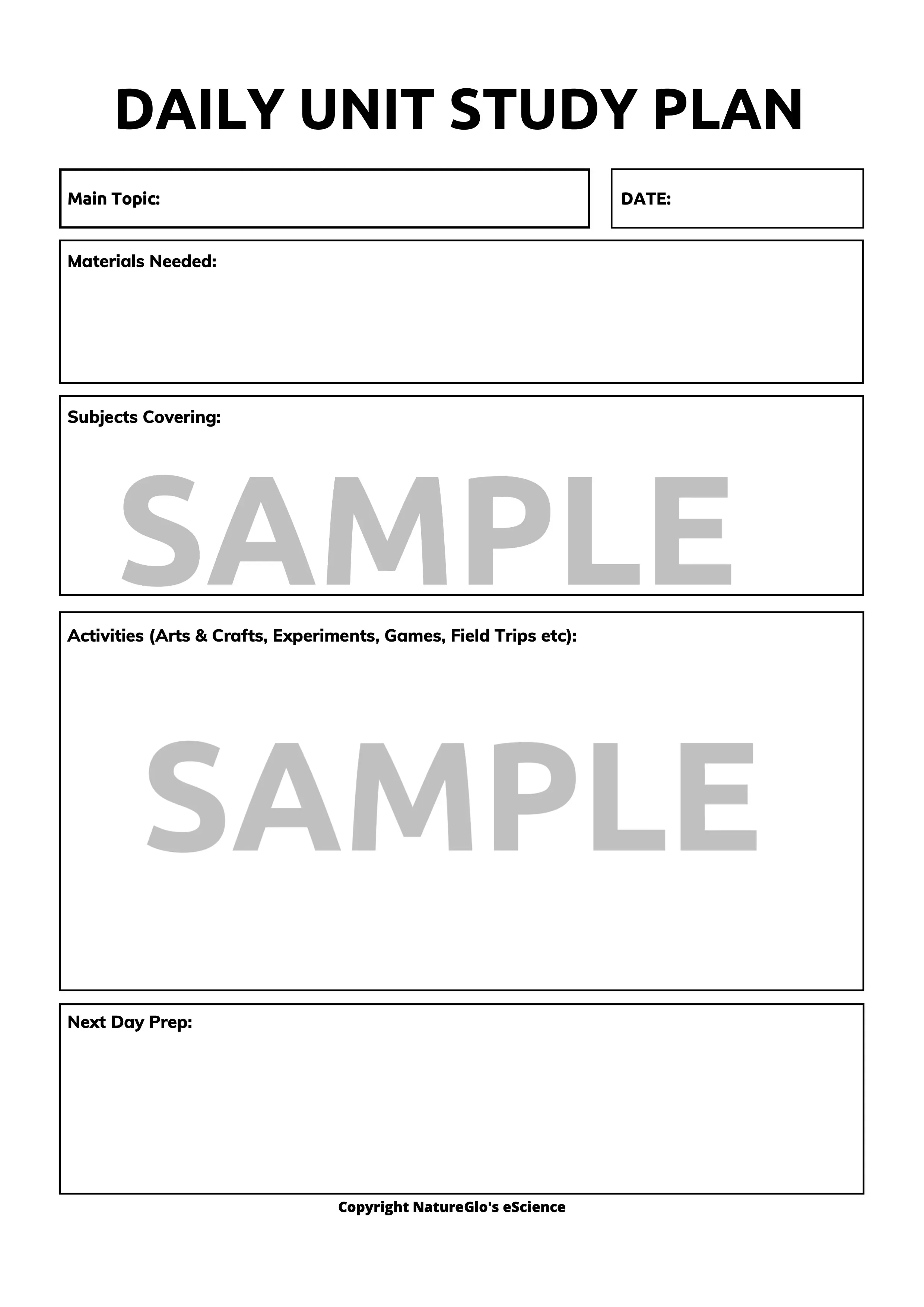Easy Unit Study Planning 101
One of the most popular homeschooling styles is unit study homeschool, but, why? Unit Studies are great because they can be tailored to the interests of the learner. If your child is fascinated by skateboarding, for example, you can get resources focused on that topic, thus satisfying your child's curiosity and freedom to learn about skateboarding their way.
The Biggest Unit Study Mistake
One of the biggest mistakes, if not the biggest mistake that I see with unit studies is that the adults choose the topics without the children's express interest. That's why I wrote this post about having a unit study discussion with the children before choosing the next unit study. For best unit study learning results, first ask the children about what topics that they'd like to learn. Next, ask the children what resources they want to learn the topic with. Children can also help find the resources that they're interested in using such as books from the library and games that you may already have on hand.
The most successful unit studies include a topic focused on the child's interests supported with resources that the child wants to learn their topic of interest with.
Unit Study Vs. Unschooling
Unit studies are akin to unschooling in that adults can focus the study around the child's interest. Just like unschooling, the adults gather the resources helping the child learn about what they're most interested in. The main difference with unschooling, is that learning is happening all the time and you're not following the unit study framework. There typically isn't a curriculum involved with unschooling unless the child asks for one.
Unit Studies don't Have to be Time Consuming to Create
Planning and scheduling a homemade unit study homeschool or classroom curriculum doesn’t have to be hard or overwhelming.
The number one reason why homeschoolers shy away from planning their own unit studies is the big T-I-M-E factor. Most homeschool parents are crazy busy running a household, raising kids, and possibly working a job in that already intense schedule mix. Life can just swallow a homeschool parent up between work, household responsibilities, nurturing relationships, and other ongoing obligations.
No, unit study creation doesn't have to be time consuming. Unit studies can literally be created on the fly without them being anything "formal", or, even necessarily pre-planned. This can be hard for home and school educators to do though, as our education culture seems to focus heavily on relying on planning. After years in the classroom, constantly planning, I finally learned to relax into the learning journey with the kids leading int their learning and simply recording what learning occurred AFTER the fact.
Sound easy enough? It really is!
You can literally follow your child's learning interests as they come up, quickly get some resources to fuel their interests, like spine books, a game or two with a movie and you're good to go. Later on, in the evening, you can use my unit study planner bundle below to help you record what concepts your child covered for your state reporting. Batta BOOM! Done.
The thought of creating a homeschool unit study from scratch can easily overwhelm a homeschool parent sending them running for the hills.
Why Learn to Plan Your Own Unit Studies: Flexibility & Freedom to Learn
The fundamental reason a homeschool parent would want to learn how to plan and do the homeschool unit study approach is #1, for the flexibility and FREEDOM of learning what and how tailored precisely to their kids top learning curiosities. It will become very empowering to know how to do on the fly, or, relaxed unit studies.
Yes, there are TONS of free unit studies all over the Web. But, what are the chances that you'll find freebies for EVERY single topic that your kids are super into? Not likely, right?
Therefore, you want to BE empowered to create your own short and long unit studies both in-depth and on the fly.
Get my easy to use unit study lesson plan template bundle below.
It includes a variety of templates so that you can be as elaborate or as simple as you want with my streamlined one-pager where you can record on the fly unit studies faster and easier than ever.
Below is a sampling of what your family's topical brainstorm discussion template could look like using NatureGlo's Unit Study Brainstorming template found in NatureGlo's Unit Study Planner BUNDLE.
Say your family is really into skateboarding. Thus the red arrow pointing to the main learning topic of skateboarding in the brainstorming template above.
TIP: You can use multiple brainstorming template copies for additional topics.
1. Red Arrow - Main Topic - Choose ONE topic that your child(ren) is/are most interested in learning about and write/type it into the circle. See my skateboarding topic example above.
2. Pink Arrow - Unit Study Books. You and your kids would come up with skateboarding book titles off the top of your head or via Google searching, and jot them down in NatureGlo's brainstorming template. This list can include books from your local library, eBooks urls found online, or books you already have at home or ones that you could borrow from friends or family.
As you and your kiddos get into the unit study learning experience, you'll want to find one MAIN book or visual encyclopedia about the main topic that satisfies multiple curiosities your kids have and use it as a main reference or "spine." Many topics that your child could adore may have an entire encyclopedia dedicated to it.
My personal favorites are the visual encyclopedias from Dorling Kindersley (DK), Smithsonian, and Usborne, all found at your local library or easily ordered via Amazon.com. These main "spine" books can be your strong unit study jumping off point for naturally finding your other core subject connections.
3. Green Arrow - Movies/Shows. - Look together for movie ideas online or you and your kids may already know of some movie/show ideas.
4. Purple Arrow - Unit Study Online resources. Simply look for online resources related to skateboarding. Use keywords or keyword phrases in your Internet searches that match your kids' specific interests.
For example:
- Skateboarding tricks
- Skateboard art
- Skateboard physics etc.
Search for those terms and either copy/paste or write in the urls into the brainstorming template.
5. Aqua Arrow - Unit Study Activities/Projects. - Brainstorm skateboarding activities the kids would love to do. Consider experiments, building projects, and arts & crafts.
6. Yellow Arrow - Unit Study Field Trips. Brainstorm all the possibilities and opportunities there could be in your local neighborhood and surrounding area of skateboarding related field trips you can do. My personal favorite is visiting a skateboard factory, if such a place existed within driving distance.
7. Peach Arrow - Unit Study Materials. After you and your family have brainstormed all of the other resources, coming up with a list of materials should be simple. Think about the activities you want to do and come up with a rough draft of materials you'll need to do those activities.
After your family unit study brainstorming discussion, now you'll have a superb jumping off point to sit down in a quiet place, to plan out the rest of the unit study, or, use the template to record on after the fact, if you have zero prep time.
The rest of the planning process doesn't have to take hours and hours to do, unless you want to and have the time.
How to Plan a Mini Unit Study Using a Seashore Sample
Watch the video tutorial below about how to use NatureGlo's unit study brainstorming template.
Here's an example, using NatureGlo's Mini Unit Study Planner template, on what planning can look like with all the major unit study resource planning categories found on one page.
This time, we'll use a sampling of the Seashore Unit study, of which the full version is included in NatureGlo's Unit Study Planner BUNDLE.
Let's have a look at the Mini Unit Study template planner below which is partially filled in using a seashore unit study.
Planning a mini unit study is great for when your kids have a fleeting interest in a topic. If their interest grows during a study, however, you can always graduate to using the longer unit study templates found in NatureGlo's Unit Study Planner BUNDLE, which divides up each resource type into its own dedicated page.
As you can see, with this Mini Unit Study template, you have much more space than you had with the brainstorming template to write or type in more Book & ebook titles/authors. Same thing with the Videos/Websites and Games/Activities/Field Trips spaces. If you write or type small enough, you can squeeze a lot of resources into those spaces.
NatureGlo's Longer/Spacious Unit Study Templates
Here are 4 templates, 1 per major planning category, below.
The major unit study planning categories include:
- Books & eBooks - both physical and digital books
- Websites - urls for your topic's web resources
- Videos - including TV shows, YouTube videos, any online videos, or regular television shows
- Games, Field Trips, Activities - which can include things such as science experiments, outdoor nature connection, travel, arts & crafts, board games, and more.
How to Use a Homeschool Daily Unit Study Plan
Next, you can use the Daily Unit Study Planner template and lay out as many days as you want ahead of time.
- Main topic. You would add your main unit study topic at the top with the day's date. This can flex as you may have enough content to cover more than a day.
- Materials needed. Here you would add your books titles, ebook urls, projects/activities physical materials
- Subjects covered. Use this space to add in all the core subject connections. Example: Seashore math - collect seashells and make patterns. Language arts - Read the story of Sally Playing with Seashells at the Seashore (I know...a silly example). You would do that for each core subject you're covering that day.
- Next Day Prep. The best time to plan that is at the end of any activity that you know will carry over into the next day. HOT PRO TIP: While it's fresh in your mind, jot down what you might need for the next day's activity in this space.
Running Short on Unit Study Planning Time?
If you're running short on time, you can always dive into your homeschool day just using your unit study resources on the fly following your kiddos interests. When in doubt, do a read aloud with them including discussion and journaling with sketches. Read alouds are one of my favorite go-to fall-backs either to prevent or gently steer kids away from or out of chaos.
At the end of your homeschool unit study day you can record what you covered in the Daily Unit Study Planner alongside writing about your day's adventures in NatureGlo's Unit Study Planner Journal.
Here's NatureGlo's daily journaling template. Use this for recording the events of the day in a "journal" storytelling fashion so that you have something fun to remember your years of learning by.
Finally, you'll want to set aside and keep these sheets in a folder or a binder. I highly suggest hole punching all of them (that is, if you're printing them out) and saving them in a 3-ring binder. This will become your content saved for your homeschool record-keeping and reporting.
Lastly, after you start completing unit studies with your kids, you can use NatureGlo's Unit Study Record of Completion to help your record each unit study you complete.
See the sample below.
Conclusion
Planning a unit study doesn't have to be hard or overwhelming. I've created NatureGlo's Unit Study Planner BUNDLE to help homeschool and school educators make their next unit study planning process easier, more organized, and more fun!
Once you get into the groove of planning your own unit studies focused on your kiddos top learning interests, you'll never look back.
WARNING: Unit study planning can get addictive. You begin to see all of the creative possibilities that your kids will love and adore. You might even start to fall in love with the research process like I did.
Imagine you and your kids jumping up out of bed in the morning, putting your feet on the floor ready to run, no dive into your learning day because you're excited about your unit study topic!
Finally! This is real!
This can be you!
You've got THIS unit study thang!
Go ahead now and toss down a comment.
Tell me, do you feel better equipped now to jump into your first or next unit study discussion with your kids followed by unit study planning?
Share in the comments below.
Talk soon!
NatureGlo







